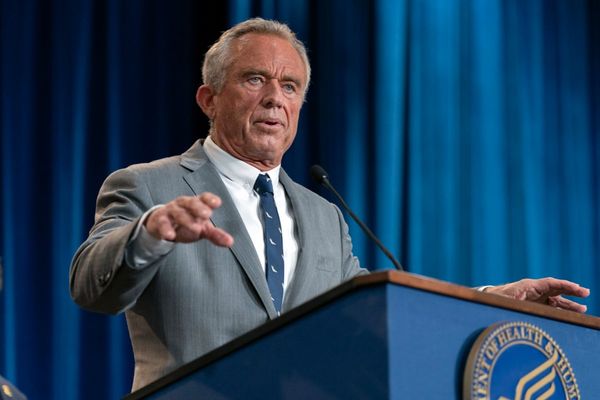A woman living with multiple sclerosis has less than two months to raise more than $90,000 to receive a bone-marrow stem cell transplant she hopes will halt the advancement of the disease.
Sarah McDowell, who lives in Mount Gambier, was diagnosed with MS in 2017 and said it had already significantly impacted her life.
"Normally I'd quite happily walk around the Blue Lake with no problems but a couple of weeks ago I was only able to get halfway round before my leg started shaking," Ms McDowell said.
"Being such a physically active person, it terrifies me where my MS could go to.
"If I can stop it now, then I'm not having to battle whatever disability I get later on for the rest of my life."
Five years of readily available treatments for the disease have not improved Ms McDowell's outlook, prompting her to look overseas for a solution.
"I've had high-level disease modifying therapies (DMTs) like Alemtuzumab, also used in leukaemia treatment, but that failed," she said.
"I'm certainly going in with a fight for this, I don't want it to take over and ruin my life."
Ms McDowell said she intended to fly Mexico for treatment early next year and had already booked her place in a clinic but had yet to pay for the trip.
High risk, high reward treatment rare in Australia
Multiple sclerosis is a demyelinating disease of the central nervous system, in which immune cells mistakenly attack the protective layer around nerve fibres, causing them to decay.
The damage caused by the disease if often irreversible, but an aggressive treatment involving chemotherapy, called autologous haematopoietic stem cell transplant (AHSCT), aims to reset the immune system to stop ongoing damage by using stem cells extracted from the patient's bone marrow.
The four-week procedure leaves the patient with a compromised immune system with a high risk of infection during recovery.
"I've been told by my neurologist that once my disability becomes dire, then I can get it on trial in Australia, but not until that point," Ms McDowell said.
"I need to get this done quickly because I wouldn't cope if I lost the ability to walk."
AHSCT procedures have been used to treat hundreds with MS since the 1990s, though in many countries it is used to treat only a handful with the disease.
According to MS Australia, each year 10 to 15 patients receive the treatment through trials at the Austin and Alfred hospitals in Melbourne and St Vincent's Hospital in Sydney, compared to an annual average of 520 MS diagnoses.
Growing interest in risky procedure overseas
Ms McDowell was motivated to seek the treatment in part by the AHSCT received by her co-worker, fellow Mount Gambier resident Mary de Nys.
Ms de Nys was diagnosed with MS in 2002 and was able to travel to Russia in 2015 to receive the treatment through community fundraising.
"I was told there was a 60 to 70 per cent chance that AHSCT would halt my MS and I took those odds," Ms de Nys said.
"The symptoms that I'd established are still here, but I pretty much live with the disease as it was in 2015."
Ms de Nys said while she was glad to receive the procedure, having to travel made the already aggressive treatment riskier.
"I certainly hope that becomes accessible to more people, we've certainly got the facilities and capability to do it here in Australia," she said.
"For someone that's already got MS, for them to travel to overseas and raise money and work and everything else, it's a lot for anyone to undertake, let alone someone with a disease."
Experts urge caution on invasive therapy
Dr Izanne Roos, a postdoctoral research fellow in MS medicine at the Royal Melbourne Hospital, has consulted with numerous patients about AHSCT and said the treatment had grown in prevalence over the past decade.
"Because it's probably the most aggressive therapy for MS, it is appropriate in the most aggressive cases that have not responded well to other highly effective therapies," she said.
"However, there are many other patients who view this as their most likely chance of cure.
"For that reason, they might pursue it even if their neurologist does not feel that it is necessarily the most valid treatment for them in their particular situation."
Dr Roos said there was still a lot of work to do in studying the long-term effects of receiving AHSCT.
"There is some evidence that there might be disease reactivation after a time," she said.
"It may be the closest thing that we have to cure, but we need to have the information available to know whether our expectations are reasonable when perusing this very invasive therapy."
MS Australia has said AHSCT requires further evaluation in clinical trials and was not currently recommended as routine therapy for MS. However, it said it was a reasonable treatment to consider where high-efficacy DMTs have failed or are not suitable treatments.
The organisation is seeking to track the number of Australians who have travelled overseas to receive the procedure through a newly established AHSCT registry.
Determined to take control
While no immediate plans to expand the capacity for AHSCT treatment in Australia, prospective patients like Sarah McDowell will continue to take the risk abroad.
"I'm already booked in because I'm determined to do it and it takes six months to a year of being on the waiting list, so I've got until January to pay the hospital over there," Ms McDowell said.
"That's all done through my GoFundMe and having to draw money out of the house. I might have to sell the car as well.
"I want to have that chance of hope that I could actually move on from MS and gain control of my life again instead of waiting for the next relapse."







